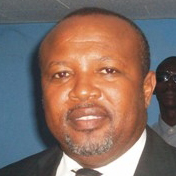Alimamy Koroma | Sierra Leone

Alimamy Koroma, Sierra Leone
For more than 20 years, Alimamy Koroma has worked for peace in his native Sierra Leone, a country plagued by gruesome civil war. Despite risks to his personal safety, Koroma served as a bridge between the government and guerilla groups, urging the warring parties to overcome their resentment by means of reconciliation. His non- violent approach draws on the country’s embedded values of religious tolerance to recognize common humanity and to seek lasting peace.
In 1991, a war broke out between Sierra Leone’s government and the opposing Revolutionary United Front, which led to tens of thousands of deaths and the creation of more than two million refugees and displaced people. Although there are many reported causes of the war—from economic inequality to tribal rivalry to the notorious “blood diamonds” that funded the war—religion was not chief among them. In fact, Sierra Leone, a country with a diverse mix of Muslims, Christians, and indigenous religions, is notable both for its reverence for religious leaders, and also its tolerance of different religious traditions.
Born into a Muslim family but later converting to Christianity, Koroma was uniquely positioned to tap into the good relations that have existed between religious groups. Koroma launched the Inter-Religious Council in 1997, positioning the organization as a mediator between the two sides. But the Inter-Religious Council’s high visibility came with a cost. Some Sierra Leoneans were enraged by the Inter-Religious Council’s policies of nonviolence and reconciliation, and, in January 1999, several members were attacked. Although they subsequently recovered, this incident reminded Koroma and other member of the Council that when they spoke for peace, they risked their lives.
The Inter-Religious Council’s hard work finally paid off in 1999, when its tireless mediating helped to broker the Lomé Peace Accords. In Koroma’s view, however, the work was just beginning.
Koroma and the Inter-Religious Council focus their efforts to sustain a lasting peace through a series of programs addressing child warfare, sexual abuse and AIDS.
Koroma became part of the government and turned his energy to working with the Sierra Leonean president to redress structural causes of the civil war. In October 2007, Koroma was appointed to serve as Minister of Trade and Industry by President Ernest Bai Koroma. Since Koroma had played a key role as former general secretary of the Christian Council of Sierra Leon, he shifted his focus to begin working from the perspective of the government to establish a sustainable peace. The global food crisis in 2007-2008 warranted creativity and Koroma delivered, securing rice from India, allowing the next harvest season to continue without widespread hunger. From 2010-2013, Koroma served as the Ministry of Works, Housing, and Infrastructure.